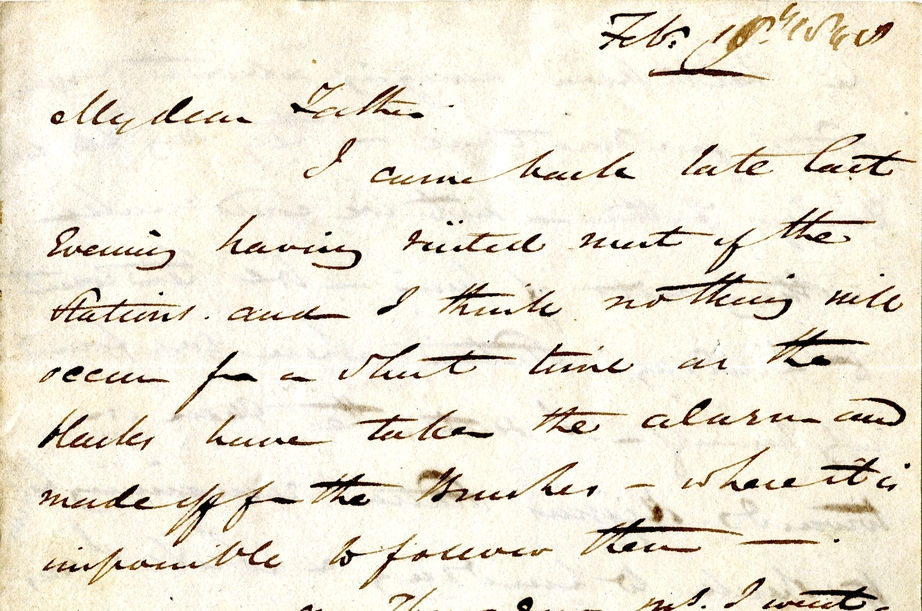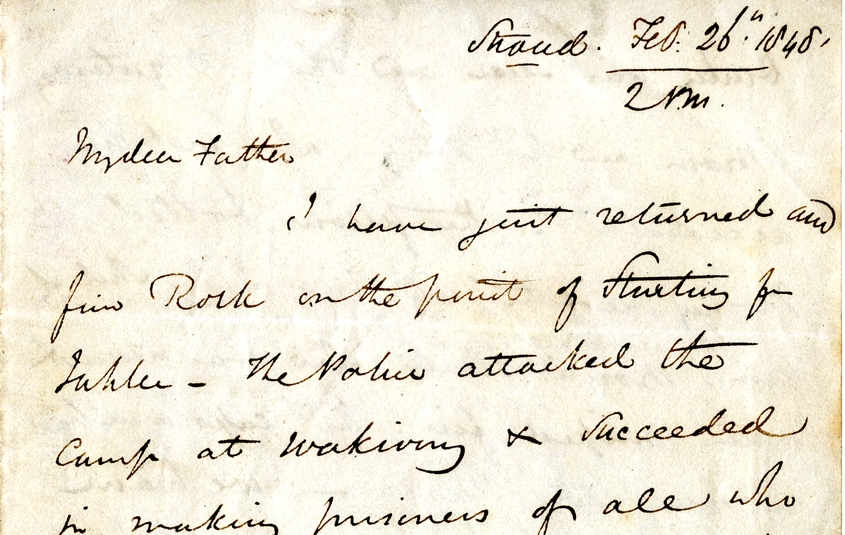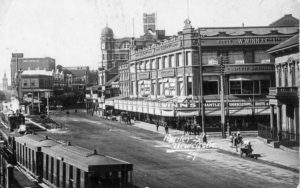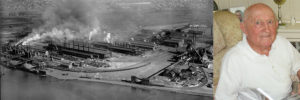Ten years ago I was loaned two fascinating letters, which I was told had been written from the NSW settlement of Stroud in 1848. The letters are of great interest since they bear very strongly on the conflict between indigenous people who had been living in the area near Gloucester and the white settlers who were moving into their territory to claim the land as their own private property. For a long time I had no idea who wrote the letters, having been told they may have been written by somebody named “Robert Scott”. Since the signature on the one complete letter is indecipherable by me, I was unable to assess this clue. However, following a bit more research, I now feel reasonably confident that the letters were written by Phillip Gidley King, who at that time was stock manager for the Australian Agricultural Company, based at Stroud. I believe the letters were written to his father Phillip Parker King, who was resident commissioner for the Australian Agricultural Company between the years 1839 and 1849.
The Kings were eminent colonial figures. Phillip Parker King’s father had been Governor of NSW. He himself was a noted explorer and politician, and his son was a good friend of Charles Darwin and later became a noted politician in his own right.
Stroud was a company town, established by the Australian Agricultural Company (the AA Co) which had been granted the right to possess enormous tracts of land in the colony of New South Wales. The AA Co had made its first attempts at farming on the northern shore of Port Stephens, but finding the land was not as useful as hoped, it pushed inland along the Karuah River to Booral, then Stroud then overland to Gloucester and beyond.
The two letters I was permitted to scan tell a grim story. It is clear that some indigenous men were being hunted for allegedly raping a settler woman named Ann Monahan, plus some other charges. The settlers were out in force against the Aboriginal people, armed and backed by a number of troopers.
We read of the alleged victim – at a presumably remote property identified as “Scotter’s” – being “much knocked about and bruised”. We read that the alleged assailant is a man known by the white settlers as “Darley”, and that he had alleged accomplices named “Tellighy Jacky” and “Dick”. We read many other names of indigenous people. We read that the police apparently lost no time in attacking a camp of indigenous people at Waukivory (just south of Gloucester), making prisoners of 20 and keeping many more under surveillance.
We read of police movements, of shots fired at fugitives, of members of other indigenous clans being pressed into service against the “hostile” group.
And, perhaps tellingly, the writer advises his father to move quickly to officially possess some of the land he has just been visiting in the course of his punitive expedition: “I have been out to the head of Ryner’s? ….. country and I strongly recommend it being taken possession of before some one pops out upon it. It is a beautiful spot for flocks of sheep”.
I have been able to discover a little more about the events described in the letters. There was an article published in The Maitland Mercury of February 23, 1848, which gives some unpleasant detail. The report stated that two Aboriginal men had raped a young female servant of the AA Co, then repeated the offence on another girl, whom they allegedly tried to drown afterwards. The article, written by an unnamed Dungog correspondent, alleged that for some months Aborigines had been openly slaughtering cattle and cooking them in full sight of the beasts’ owners, and that one camp had “thirty stand of arms” – meaning 30 firearms. This prompted an editorial in the next issue, deploring a government decision to withdraw the mounted police who had previously been stationed at Dungog to defend white settlers against Aborigines who were “numerous”, “determined” and “unusually well provided with arms”.
On March 1, 1848, the Mercury carried another report of a large group of well-armed Aborigines who allegedly had about 20 firearms and “five canisters of ammunition”. These men were alleged to have killed many cattle and demolished some huts, “taking away every nail that was in them, which they cut up into shot with their tomahawks.” If this is true it would suggest better organised indigenous resistance than is usually described. On the other hand it may be exaggeration designed to bring more police into the district.
The Sydney Chronicle of February 24, 1848, reported that the Governor had approved a £25 reward for information leading to the arrest of the alleged rapist, Darley. The crime was said to have taken place on Sunday the 13th of February, at a station of the AA Co, in the County of Gloucester.
An arrest was reported in the Mercury of March 8, 1848. In this article the accused rapist was named as “Darby” and it was reported that he had been captured by an overseer of the AA Co. It was also reported that “the mounted police have been most active, with P.G. King Esq, in securing every native they could find, and have had them all in the Stroud lockup for some time”. One suspects that there may have been many unrecorded casualties on the side of the indigenous people, based on comments such as the following: “One of the troopers, in firing at a black who made off into the thick brush, had a narrow escape, his carbine having burst. The cartridge had either worked out of its place, or in the hurry of loading had not been properly sent home”. If shots were being fired at unidentified “suspects”, it’s hard to imagine they all missed fire.
The evidence suggesting that the writer of the letters is Phillip Gidley King is persuasive. King was named in news reports as having a leading role in the hunt, and his role with the AA Co would make that logical. It is also logical that he would be writing to keep his father – the AA Co Resident Commissioner – up to date with details. Again it is logical that he would be in a position to issue warrants in relation to charges, and to powerfully influence the movements of mounted and foot police. At least one of the rape victims was an AA Co servant, which would explain the interest of the company’s officers in the matter.
I’d be very pleased if any researchers can shed more light on the topic, and also if people can help complete my effort at transcribing the cursive script into more legible text. My transcriptions follow, along with links to images of the original letters, which may be freely downloaded. (Note the first letter is incomplete.)

Letter 1
Feb 19th, 1848
My Dear Father,
I came back late last evening having visited most of the stations and I think nothing will occur for a short time as the blacks have taken the alarm and made off for the Gloucester (?) – where it is impossible to follow them – .
On Thursday inst I went out with a party of (8?) – and at Mr Hall’s we were (joined?) by a Dungog black “King Darly(?)” who pretended to be very keen after them but in the end played us false by decamping us.
At Eason’s station I heard that the men at “McCormick’s Corner” were all right and I therefore pushed on to Laver’s a little beyond which to the left of the road we saw a smoke and found an old blackfellow apparently dying.
He had been hanging about Laver’s station for some time – they say he is Darly’s father- but we could muster nothing out of him. We then went to Lindsay’s station where we found only himself.
I sent the men on towards (Ryner’s?) Station remaining behind to speak to Lindsay and while I was absent from the party they allowed the black “King Darly” to escape at which I was very vexed. ( I fear the constable ….. is too …. and cautious to do much good).
He knew the black ….. back but still trusted him. I have no doubt he went off in the direction of Monaghan’s Station as it is between that place and Lindsay’s that they hung out.
Ryner(?) I found prepared to go out with two of his men. I therefore left the constable and Corbin with him and told him to beat the country behind his station and back towards to the east of Laver’s which he was to do for two days (till tonight). I then went on to the Avon. Slept there and the next morning followed the track for the Mountain Paddock to Monaghan’s outstation. Then to his home station which we found deserted, the poultry and cats alone remaining. We remaining here some time and then went on to Scotters’s where I heard Ann Monaghan’s story. She is much knocked about and bruised. She only came to her proper senses yesterday morning.
– From Scotter’s we went across to Laver’s again, hoping to hear some news but they had heard no tidings of the blacks and the constables from Dungog which I had sent for had passed on their way up the road.
James Monaghan the eldest son on Friday inst. walked from Ryners to Scotters and says in the scrubs between the two places he saw the two blacks hunting kangaroos but he told conflicting stories about them and I do not put much faith in what he says. I think King Darly went to them and told them that we were after them and if so they will keep out of the way for some time.
Fr McPherson and a man named Tulle are going out to spend a month after them and they will … the best [The letter ends here.]
To see a PDF file of the letter, click here.

Letter 2
Stroud, Feb 26, 1848, 2PM
My Dear Father,
I have just returned and find Rorke on the point of starting for Tahlee. The police attacked the camp at Waukivory and succeeded in making prisoners of all who were there, about 20 blacks, with a musquet and fowling piece. Among them was Tellighy Jacky and Long Dick (a receiver of stolen property, but not the Dick who is still out) who are now on their way to the lockup – also Darley’s gin.
The rest of the tribe are encamped on the grass in front of Ryners under the surveillance of the police and the blacks Jemmy ……. and King Tommy of Avon.
Darley was seen and shot at yesterday by Brown and his party who met him accidentally. The fellow bolted and Mooney, one of the party, fired a long shot at him. Brown’s black who was nearest to him missed fire. The caps were bad or some such slander. We have now 9 troopers – 1 sergeant has to return to Maitland unless I decide on keeping him – and the rest go on to the Manning. I hardly know whether to go to the Manning [for orders].
I have written to Mr Rowley to know if he will go out with them and if he says yes which I shall hear tomorrow or next day I think I shall stay. If not I must go for they look to me for orders.
I send you Ann Monaghan’s deposition ….. you return it. I have been out to the head of Ryner’s run country and I strongly recommend it being taken possession of before some one pops out upon it. It is a beautiful spot for flocks of sheep. I do not send the dep. As it does not differ at all from what I sent you. I have put a warrant for Tellighy Jackey. The men are all quiet and satisfied that sufficient means are taken for their protection. I do not think I shall be able to do more than commit? if we catch Darley for rape, Tellighy Jackey for assault with intent to commit murder and Dick for robbery. This last will be difficult. The evidence is that the shepherds know themselves for other blacks who were the depredators they never saw them out.
Dick brought in some things which had been stolen and which can be identified. I will see when we get him. Long Dick and Dick are two individuals. The former a receiver, the latter a thief. The 1st is taken the second is at large with Darley.
I am sorry to hear my mother is unwell. I hope she is better now.
With love I remain yrs affectionately
PGK (?)
To see a PDF file of the letter, click here.
My thanks to June Macey for the loan of these remarkable documents.



